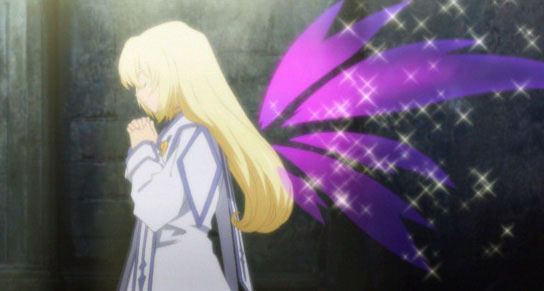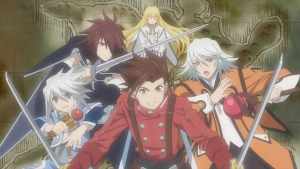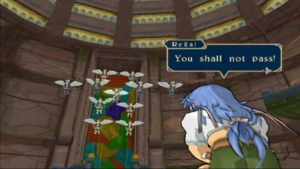Tales of Symphonia’s Deconstruction of Self-Sacrifice
Like many video games, many installations in the Tales of Series contain the popular trope of “heroic sacrifice.” In Tales of Zestiria, the most recent addition to the series of JRPGs, Sorey sacrifices himself to cleanse the world of malevolence. In an earlier game recently remade for the 3DS, Tales of the Abyss, protagonist Luke is left behind to free the goddess Lorelei. In both instances, the final animated scenes imply the rebirth of Sorey and Luke. The player is, in the end, rewarded for suffering for and with the characters with a dangling hope that they still have a future.
Tales of Symphonia, a Gamecube-era Tales of game ported to Steam this year, fights against the idea of self-sacrifice. The player is Lloyd Irving, friend of the Colette Brunel, who was chosen to regenerate the world called Sylvarant. The plot dramatically pivots five hours into the game, revealing that Colette must die to regenerate Sylvarant — she must die and be reborn as the goddess Martel. Lloyd and his friends immediately reject this, using the seemingly simple argument that they would be sad without her. This position is reinforced throughout the series as various characters tackle the issue of self-sacrifice. All the while, Lloyd searches for his own solution — an at first naive, idealistic, impossible, win-win solution — that does, amazingly, succeed.
Playing the game as an adult, it is easy to see the flaws in the ideals spouted in Tales of Symphonia. In game, Lloyd even gains the title of “Idealist” — his hope to find an answer that will benefit all is criticized by many characters. The fact that his ideals reach fruition can seem too convenient, to the point of being ridiculous. These observations, however, do come from jaded eyes. The solutions found in the game are hard-fought and well-deserved, especially after sixty hours of gameplay. Ridiculous as the story may be, Tales of Symphonia teaches us to hope, to strive, and — most importantly — to never throw your life away.
Colette Brunel’s Journey of World Regeneration

Colette immediately is touted as the Jesus figure of the series. The first thing we learn about her is that she’s the Chosen One of Sylvarant. In the first hours of gameplay, however, Colette already is much more than that. She’s a round character: klutzy, loving, brave enough to walk straight in the middle of danger, constantly apologetic, and full of ideas of self-sacrifice. Unlike the player and most of the characters, she knows from the very beginning that she must die to save her world. She shoulders this burden gracefully: she uses a white lie to try to cut ties with Lloyd, and she tries to keep the slow loss of her hunger, sleepiness, and feeling to herself for the most part of the first half. She is deeply religious despite her looming death, as shown by her inspiring characters suffering from loss of hope.
Consistently, Colette says: “I will do my best to regenerate the world.” When Lloyd discovers her slow loss of her human senses, she justifies her secret-keeping by saying, “This is what it means to become an angel, so I mustn’t let it get to me.” She earnestly apologizes for everything — even for accidentally making an assassin fall into a trap door. Colette’s behavior throughout the first part of the game indicates that she has accepted her fate — and as a result, she has a low self-worth.
After the pivotal moment of the game, Colette’s consciousness is temporarily subdued as Lloyd and the others search for a way to save everyone. Even after she regains consciousness, she undergoes another illness: the crystallization of her body. Like the issue of world regeneration, she doesn’t tell the others about her suffering. She struggles with her relationships with others. She struggles to accept a place in the world that doesn’t mean her dying.
Colette comes out of the game as an amazingly admirable figure. Her whole life, once centered around death, becomes centered around life. Colette, too, begins to teach the others that all life is precious.
The Win-Win Solution

Tales of Symphonia makes the argument that a system that requires such sacrifice is a twisted system. It is revealed that the world regeneration will only save one world, Sylvarant. The other world, parallel to Sylvarant, Tethe’alla, will decline. The hourglass will be flipped once more after another sacrifice. The establishment that runs this system, Cruxis, is led by a half-elf, Mithos, who uses the Chosens from each world as vessels to attempt to revive his dead sister, Martel.
Using godly means, Mithos created this system. Lloyd embarks on a journey to reverse Mithos’ actions, reuniting Sylvarant and Tethe’alla and reviving the Great Tree that provides the world with life-giving mana. The party goes as far as altering the very fabric of world dimensions to ensure a world where “Sylvarant, Tethe’alla, and Colette can all be happy.”
The win-win solution is present, but is by no means easy. The group travels between the two worlds, defeating Desians, making pacts with Summon Spirits, and avoiding assassination by multiple establishments. Their method is trial-and-error, grappling with what clues they have to fix the broken system. What they search for is not compromise — it is ultimate victory. Lloyd, the head of this movement, perseveres for a world where “goodness and love will always win.” Issues of race and discrimination are also addressed — Lloyd’s world is also a world where the villain, Mithos, a hated half-elf, can live peacefully.

In Tales of Symphonia, the list of characters who successfully die or attempt to die for the greater good is extraordinarily long. In fact, it includes the entirety of the main party — Lloyd excepted. On a venture to save a kidnapped Colette, your party is slowly picked off in back-to-back heart-wrenching scenes of self-sacrifices. They return just in time for a boss battle, stating bravely: “I want to live in this new world!”
Each character, from their first encounters to this point of the game, has developed beautifully. Colette, a girl whose death will save a world. Sheena, a summoner who accidentally killed half her clan. Zelos, a Chosen sold to the state. Genis and Raine, representative of a race hated by both humans and elves. Kratos, Lloyd’s father, who helped Mithos create this twisted world. Presea, a timeless girl shunned by her town. Regal, a man forced to kill the woman he loves. Lloyd gave them all hope. Through Lloyd, they all realized that they are deserving of life in the new world. Lloyd reached out his hand to everyone — including the antagonist, Mithos. The greatest disappointment is that Mithos didn’t take the hand.
What do you think? Leave a comment.











I’ve been wanting to play Tales of Symphonia on the GameCube for a while. It sounds FANTASTIC!
The problem with Symphonia is that it isn’t a game I can play around other people because scenes can get awkward and when you get into a battle, the characters are shouting the same grunts over and over which makes you want to turn the TV down, but you don’t because you want to hear the amazing soundtrack. These flaws make me not play the game. If there is a way to turn off the character voices in battle, then I would like to know.
If there’s a flaw in ToS, it’s the battle system, which I wish was a little more nuanced like other Tales of installments. I think there might be a solution in the system options for you. If not, I hope it becomes something you can overlook! The storyline was really excellent.
This was the game that actually got me interested in RPGs. The story was amazing and the characters weren’t all so one dimensional like some other RPGs or other tales of games. Its definitely worth a buy and definitely shouldn’t be overlooked just cause its old or not something you’re used to.
Thanks for your comment! Tales of Symphonia was my first JRPG, but I have yet to find one with a story that tops it.
I have to disagree. While Symphonia’s cast is a very charming and likeable bunch, they lacked any notable development. With the exception of Zelos and (To an extent) Regal, no one changed, the casts of most of the other games in the series were richer in detail and more fleshed out.
Excellent work on this one! It’s been a long time since I’ve played Tales of Symphonia, but I appreciate the detailed character analysis.
I popped my RPG cherry with ToS and I fell in love. I wasn’t thirsty for an RPG on GC either, so I genuinely loved this game. It has some of the best Tales Characters, to the point where one of them always is in the top 10 on “Tales of…” popularity polls in Japan. I was very disappointed in the sequel however: 1) Because ToS’s strength came from voice acting and great memorable characters, so having voice actors NOT RETURN to the sequel and relying on two new characters who thrive on some b/s Romeo/Juliet complex is piss poor and does not do the original justice. 2) THEY TOOK AWAY MY MOTHERLOVIN WORLD MAP ROAMING. Half of what made ToS great was the world map roaming, guide posts, rheiards, elemental cargo, etc. This is also b/s 3) It was on the wii. 4) That monster, pokemon bull they added. Keep pokemon in it’s own game please and thanks.
LOVED these games.
This is not only my favorite RPG of all time, it’s also my favorite game of all time. I rate games by class: poor, sub par, good, great, and godly. Currently only 2 games reside in godly. This game, and LoZ: MM. And both for the same reason. They both have amazing stories (whilst not unique to the tales series, ToS is unique for an RPG story), both have endless hours of side quests, both have incredible sound tracks, and (more in tales of symphonia’s favor) the voice acting doesn’t suck.
I agree! The obvious and most enjoyable add-on to the Symphonia world would be to follow the Kharlan Heroes, Kratos, Yuan, Martel, and Mithos. Bandai didn’t do the series justice with the sequel.
This was my favorite gamecube game ever, thanks for the analysis.
I’ve never played a Tales game before, but I’m thinking of getting into the series. Should I get this or Xillia? Symphonia sounds good, but I’m kind of put off by the art style.
The 3D art is pretty bad in ToS, but it’s something I forgive in virtue of everything awesome about it. I haven’t played Xilia myself, but I’ve heard it’s a little different in setting than the typical Tales of game and got mixed reviews from the fandom. Personally, I”d go with Tales of Symphonia — it’s an easy favorite.
Xillia is considered mediocre by tales standards. But if you wish to start, ToS would be great, however on ps3, the frame rate is cut in half from 60 to 30fps, and there are these little irritating things you can’t fix. Go with the GameCube version of ToS.
I was playing Tales of Symphonia the other week and its still a super fantastic game but man does it look terrible on Gamecube with a big tv, very muddy and blurry.
I enjoyed it when I was young, but after the improvements we’ve made on graphics it kind of is frustrating. Bandai keeps releasing new ports of it, when what we really want is a total remake. I suppose the struggle with that is that we’d want all the great voice acting to remain intact.
Get a HD upscaler, It makes it look sharper, but its not true HD.
it will be awesome experiencing these games again. the first one anyway. tos and xenoblade are the only two rpgs to have my absolute attention from start to finish.
The first is one of my all time fav JRPGs. The sequel is a fullminating pile of garbage that should never have been made
I always thought Symphonia was the best because of its story. While the rest of the Tales games improved the game play, the stories felt weaker and weaker. Especially Xillia, I loved the game play but thought the story was boring.
I remember trying to play Graces F and not liking any of the characters or story at all, but enjoying the updated gameplay. Zestiria’s storyline was bearable, but it was the battle style that kept me hooked overall.
I felt that the difficulty of the games started getting easier too. They keep adding these crazy new stuff to the battle system, but that made enemies and bosses so damn easy in turn, I don’t like it when it’s that easy. Xillia and Graces were my least liked games cause they virtually made you too overpowered.
It’s one of the best stories ever for me ! it’s a masterpiece .. one of the best games of all time ..
THis game is everything wrong with “traditional” jrpgs. Its just awful, dont see why people praise it. Nostalgia?
did you ever played it ? and what is the perfect jrpg in your opinion ? ( i would really like to hear your opinion mine is final fantasy ix )
My cousin introduced me to the Tales series about a year ago with Tales of Graces. Since then I picked up Vesperia, Both Symphonias, Abyss, and Xillia.
I love TOS. Now only is it the best Tales game but one of my favorite RPGs ever!
Tales of symphonia is the best game out of the tales series. All the stories do have some sort of sacrifice from one of the protagonist. They have done this so much that they ended up watering down their own series. There newest game Tales of Zesteria the protagonist has to give up his old life for the greater good. The game is okay, but the camera during battle sequences is shit.
Tales of Symphonia was the first tales game I played besides chrono trigger to give me a feeling of going on an epic adventure, you got to know and love the characters and every spot of the story felt how ever minor that you were changing the world for the better and the worst. I played for the first time since I bought it when it came out and I still felt the same when played it that first time. A really great game!
This is one of the more interesting games in the series. I was able to play both Tales of Symphonia and Tales of Symphonia: Dawn of the New World when they became available for download on the PS3. Having played other Tales games this one caught me a bit off guard. Even though the game is from the early 2000’s the graphics aren’t terrible.
Excellent article! Great to read.
Thank you for this article. Although dialogues in the Tales series usually lack depth, Tales of Symphonia affected me a great deal when I played it as a young teenager. The title you chose is perfect. I would add Botta’s sacrifice, which is one of the most emotional and unexpected moments in the game.
Definitely one of my favourite games. Thank you for the article!
This was an amazing analysis and I appreciate reading it as this is one of my favorite game sof all time
I do like that. She sees a system that is logically and morally untenable and breaks and makes a new one.